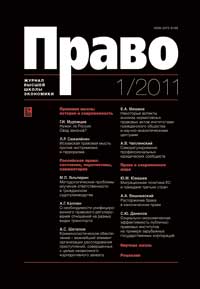Self-regulation of Professional Legal Communities: Myth or Reality?
Abstract
Chaplinskiy Alexander - Post-graduate student Department of Constitutional and Municipal Law, National Research University Higher School of Economics.E-mail: chap-aleksandr@yandex.ru
Address: National Research University — Higher School of Economics, 20, Myasnitskaya str., Moscow, 101000, Russian Federation.
The article deals with the nature of self-regulation, structure and functions of the institution of self-regulation of three professional communities acting in the area of the RF justice., i.e. judges, lawyers and notaries. The sources for the analysis have been RF federal laws, rules and other normative documents of the communities. The analysis has generated a classification of self regulation acts. The author arranges them in the following groups: acts determining rules of conduct of the community members, 2) acts of organizational character, regulating self-regulating bodies of the communities, 3) auxiliary acts (statutes on awarding, competitions and implementing social guarantees, professional education of the representatives of such communities etc. The paper also examines the essence and role of these acts in regulating professional activity of Russian practicing jurists. The author challenges an established but erroneous view of self-regulation as a phenomenon of private law which exists only outside the area of public power. He observes that implementing public power involves not only imperative but dispositive origins. He argues that dispositive origins are natural and vital which are a prerequisite for a proper functioning of state. The activity of judges, lawyers, and notaries public without any independence is of no sense. An example is self-regulation of their communities. It provides judges with some independence from the two other branches while lawyers are not provided with this privilege. As a result, self–regulation has been developing mainly among lawyers. Communities of judges and notaries public show a rather level of self-regulation. For example, the community of Russian notaries makes decisions in cooperation with RF Justice Ministry or coordinates them with the deputies of the minister. This situation leaves much to be desired according to the author.














